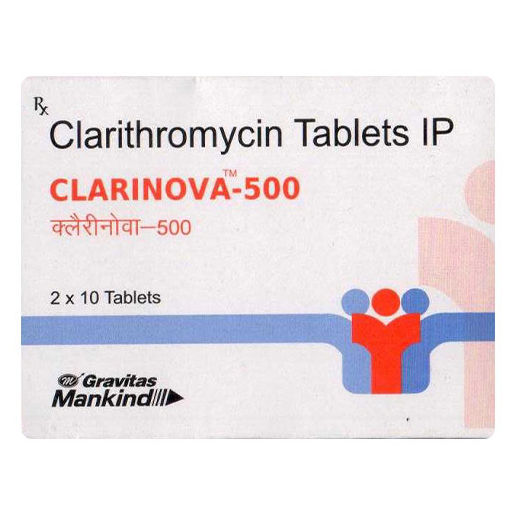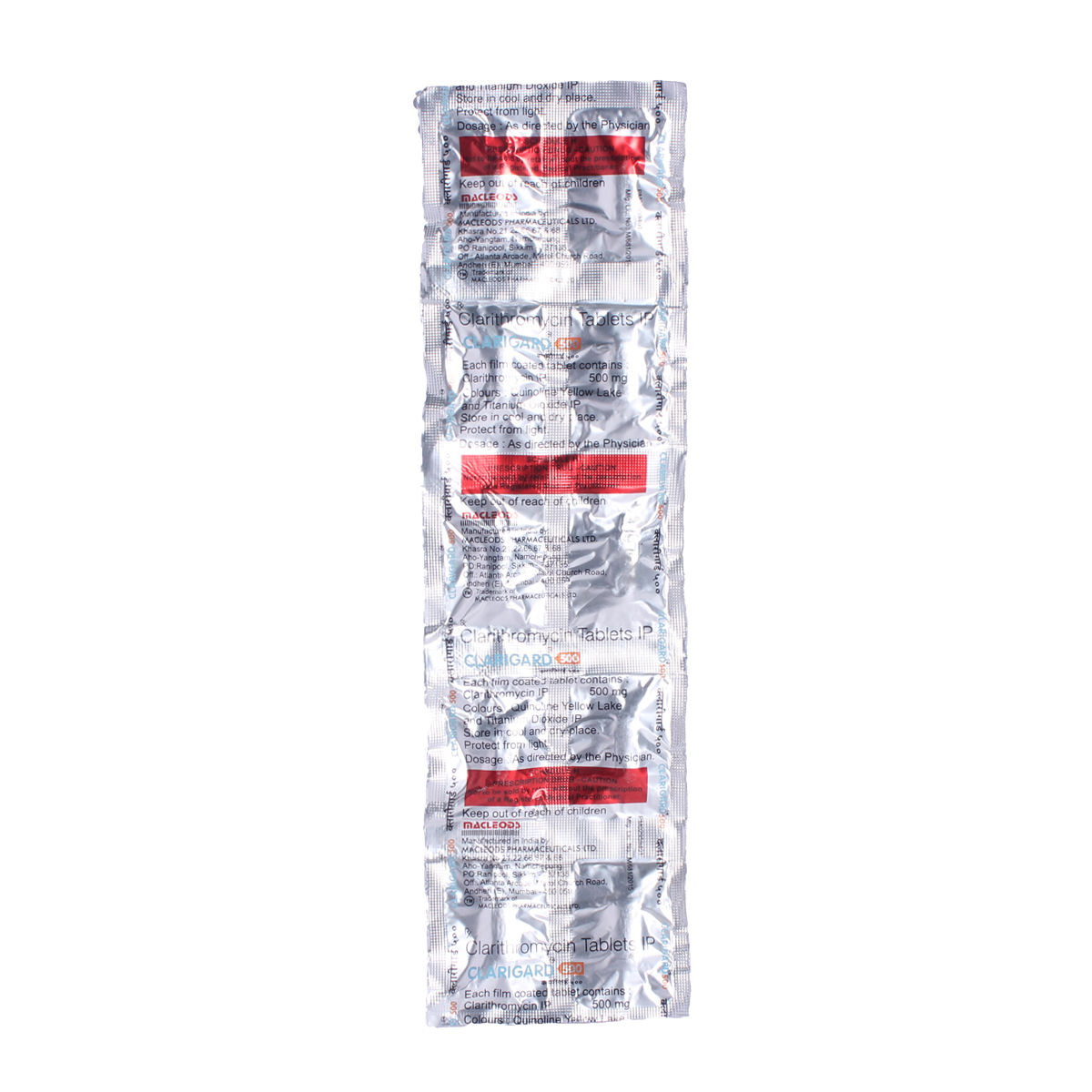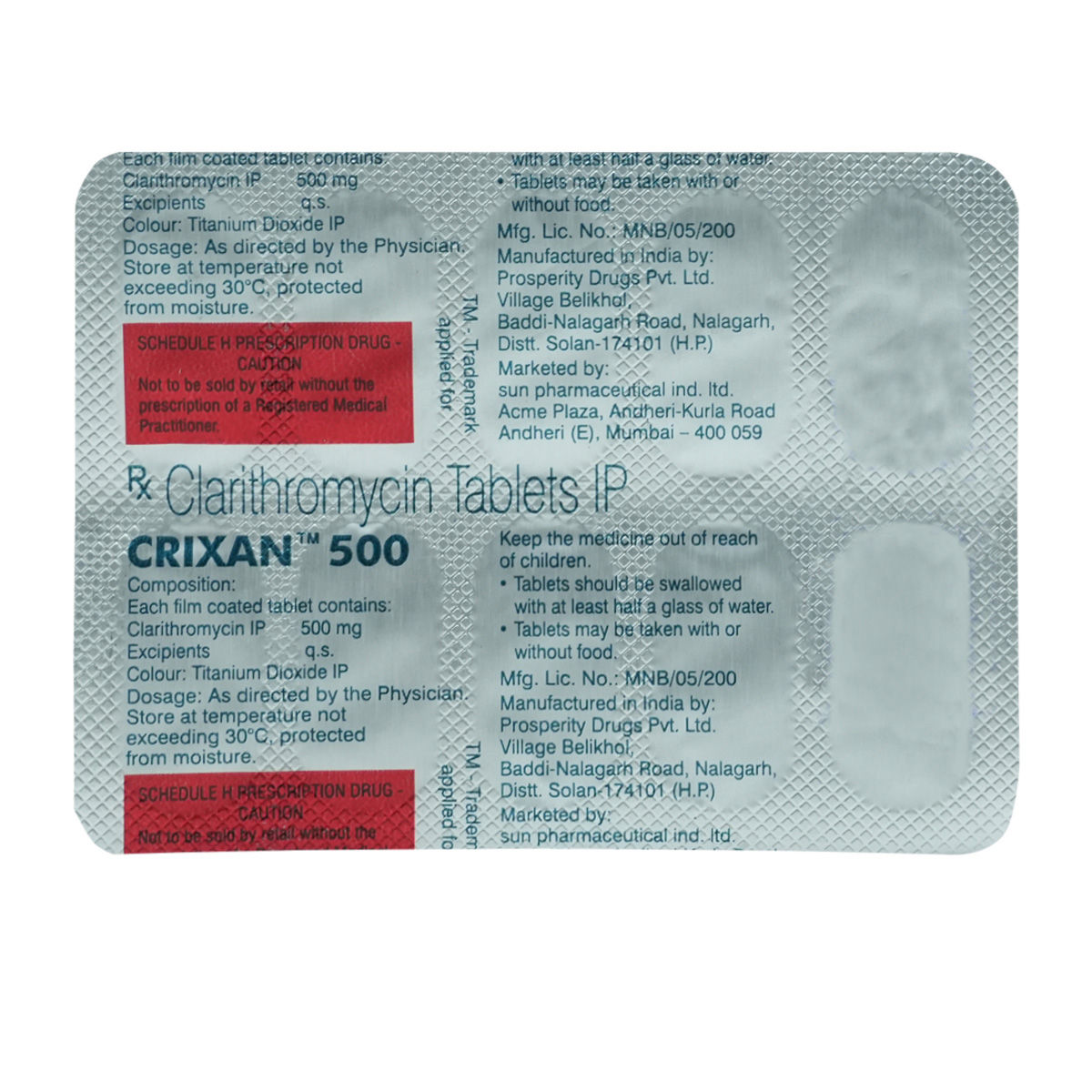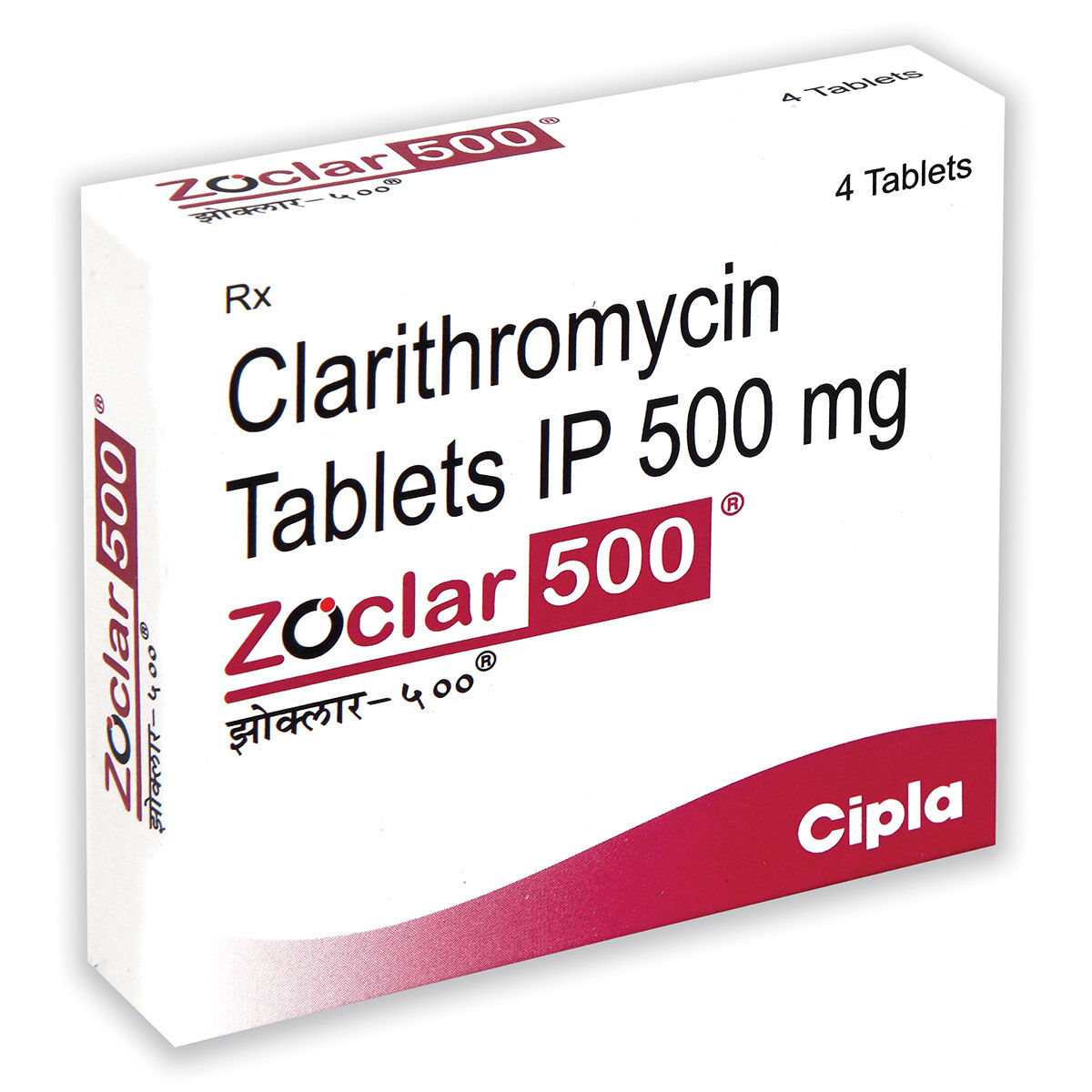Claribid 500 Tablet 10's
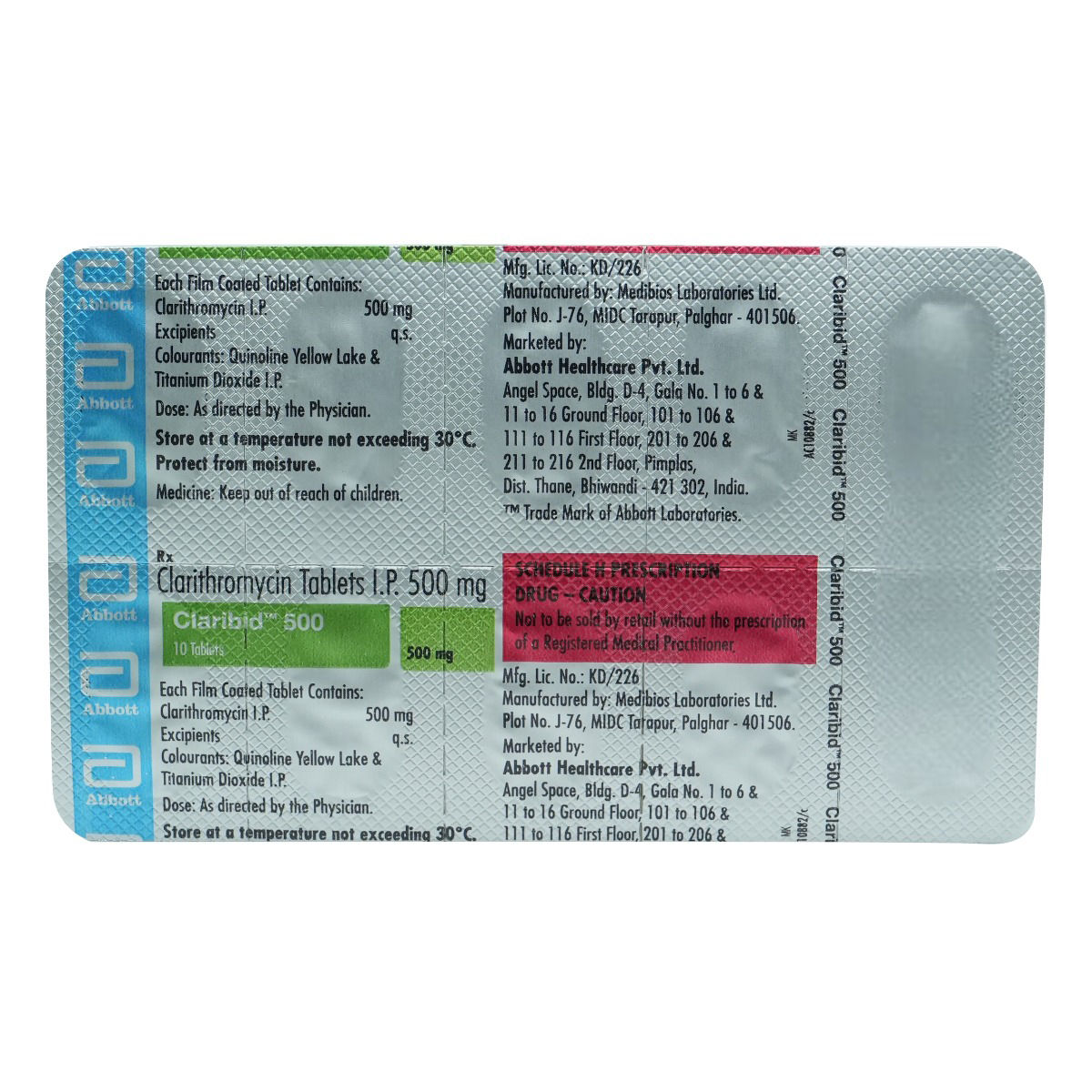

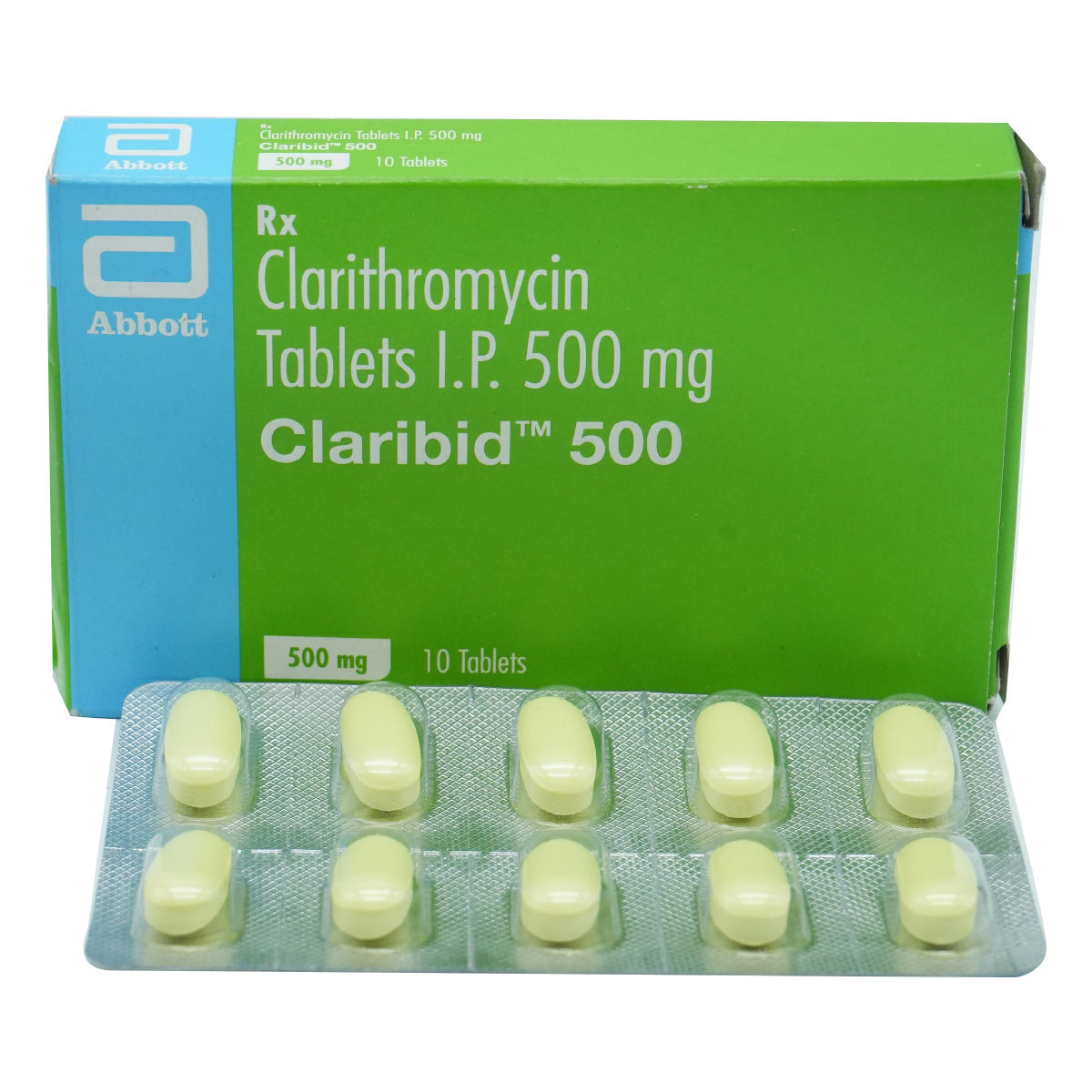
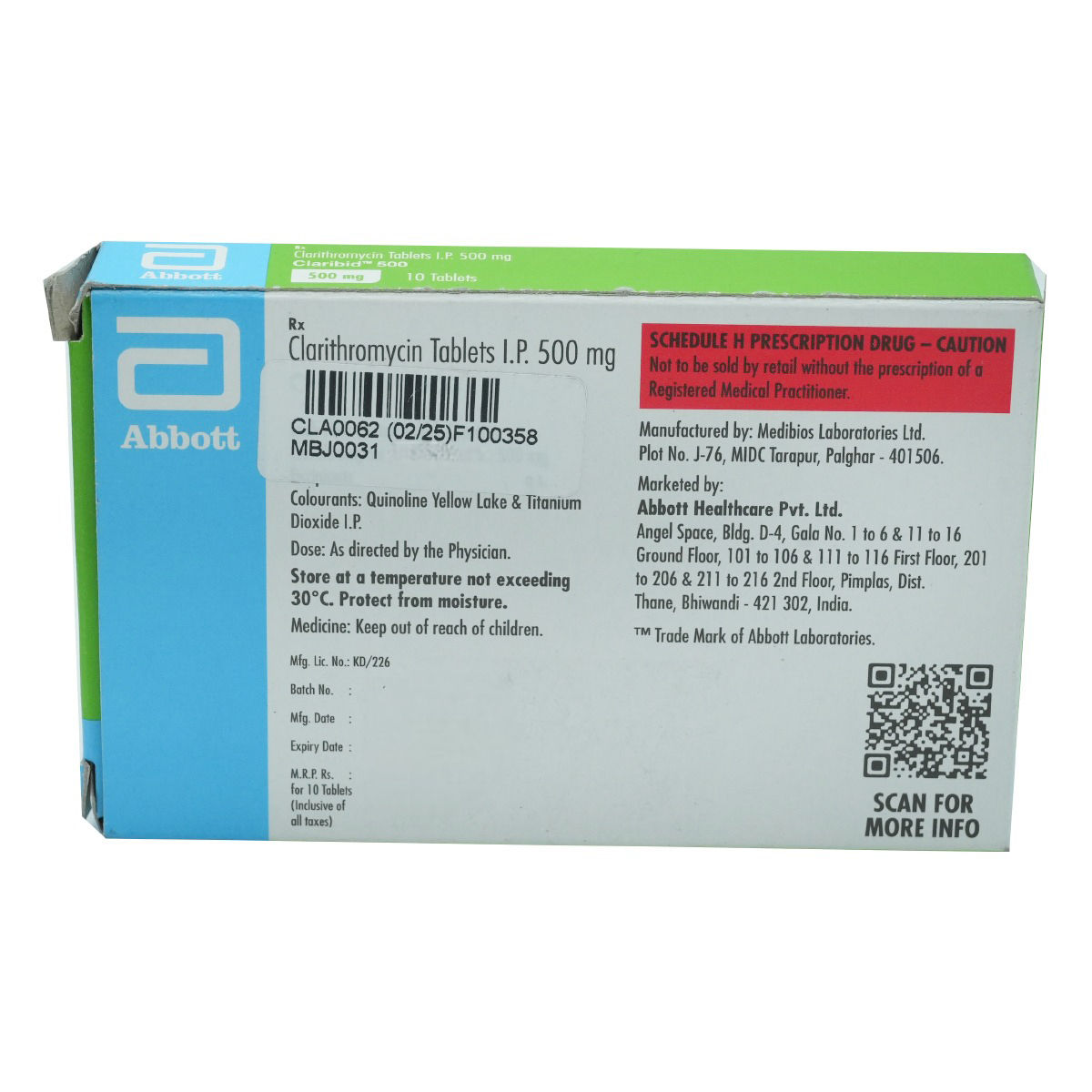
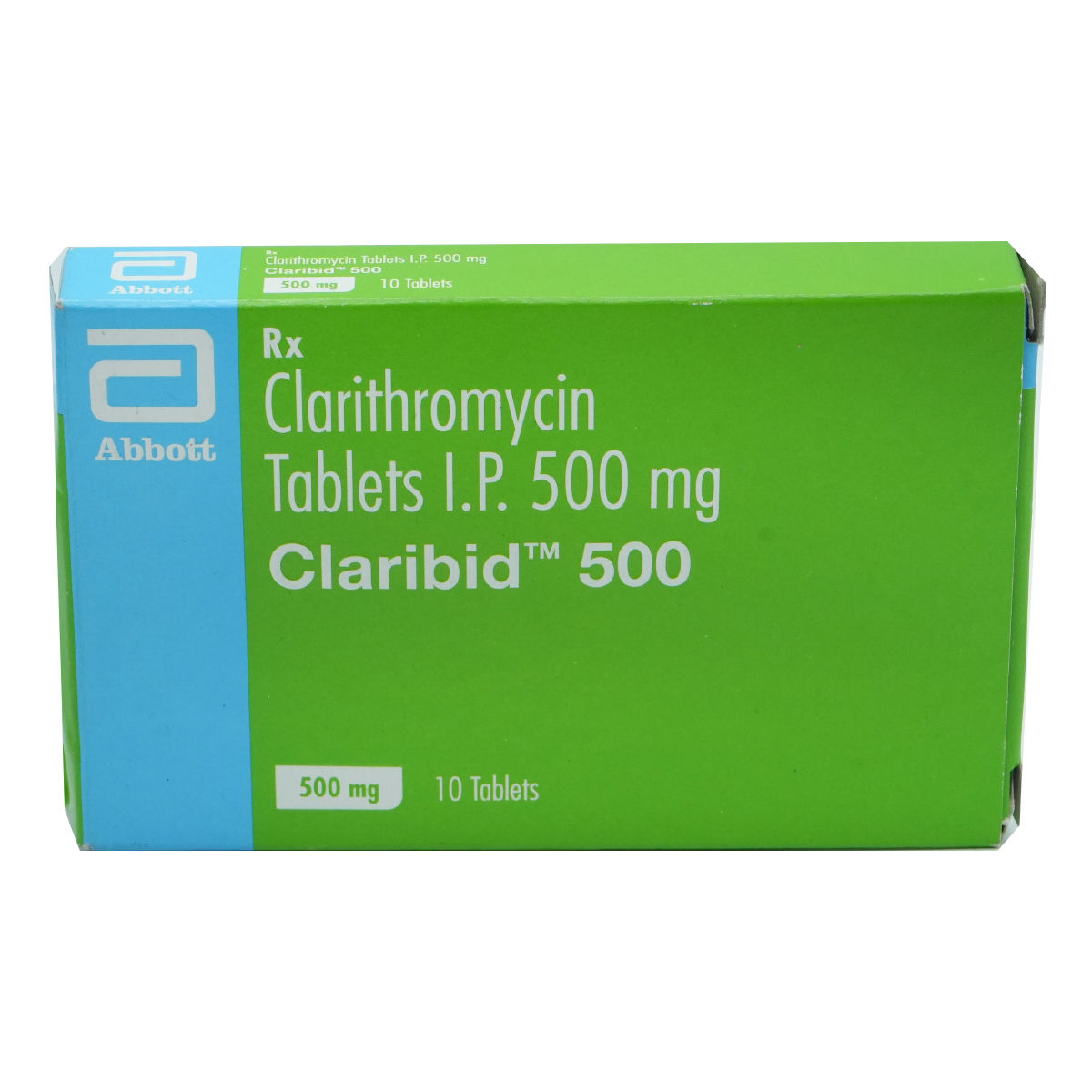
₹408.2*
MRP ₹453.5
10% off
₹385.47*
MRP ₹453.5
15% CB
₹68.03 cashback(15%)
Free Delivery
With Circle membership
(Inclusive of all Taxes)
This offer price is valid on orders above ₹800. Apply coupon PHARMA10/PHARMA18 (excluding restricted items)
Claribid 500 Tablet is used to treat a wide range of bacterial infections. It contains Clarithromycin (antibiotic). It inhibits the protein synthesis process required for bacterial cell growth. As a result, bacterial cells are not able to reproduce and grow. Thus, it helps prevent infections. Common side effects of Claribid 500 Tablet are feeling sick (nausea), diarrhoea and being sick (vomiting), loss of appetite, bloating and indigestion, headaches and difficulty sleeping.
Know Your Delivery Time
Provide Delivery Location
 Prescription drug
Prescription drugWhats That

Secure Payment

India's Most Trusted Pharmacy

Genuine Products
Composition :
Manufacturer/Marketer :
Consume Type :
Return Policy :
Expires on or after :
NPPA :
About Claribid 500 Tablet
Claribid 500 Tablet belongs to a group of medicine called macrolide antibiotics derived from Saccharopolyspora erythraea (originally called Streptomyces erythreus), used to treat a wide range of bacterial infections. A bacterial infection is a condition in which bacteria grow in the body and cause infection. It can target any body part and multiple very quickly. Antibiotics inhibit the growth of microorganisms and are given to treat bacterial infections.
Claribid 500 Tablet contains Clarithromycin (antibiotic). It inhibits the protein synthesis process required for the growth of the bacterial cell. As a result, bacterial cells are not able to reproduce and grow. Thus, Claribid 500 Tablet helps in the prevention of infections.
Like all medicines, Claribid 500 Tablet may cause some common side effects, including feeling sick (nausea), diarrhoea and being sick (vomiting), loss of appetite, bloating and indigestion, headaches and difficulty sleeping. Most of these side effects do not require medical attention and gradually resolve over time. However, if you notice any of these side effects persist or worsen your child’s condition, inform your doctor immediately.
Inform your doctor about your child's entire medical history. Other drugs or supplements should not be combined with Claribid 500 Tablet unless prescribed by a doctor. Even if your child is feeling better, do not miss any dose and complete the entire course of medication. Stopping the medication too soon may cause the infection to recur or worsen.
Uses of Claribid 500 Tablet
Directions for Use
Medicinal Benefits
Claribid 500 Tablet belongs to the macrolide class of antibiotics which is effective against a wide range of bacteria, including gram-negative, gram-positive bacteria, anaerobes, and some parasites (like Balantidium coli and Entamoeba species). It is prescribed for treating various bacterial infections, including chest infections such as pneumonia, skin problems such as cellulitis, and ear infections; on the other hand, it is also used in combination with other medicines to treat duodenal ulcers caused by H. pylori (Helicobacter pylori).
How Claribid 500 Tablet Works
Storage
- Drink plenty of fluids and consider oral rehydration solutions.
- Eat bland, easily digestible foods like bananas, rice, toast, and applesauce.
- Avoid trigger foods like greasy, spicy, fatty, acidic, and caffeinated foods.
- Gradually reintroduce fiber-rich foods as symptoms improve.
- Get adequate sleep and rest.
- Practice relaxation techniques to manage stress.
- Maintain regular bowel habits.
- Avoid overexertion and take breaks when needed.
- Consult a doctor if your gastrointestinal symptoms are severe, persistent, or accompanied by fever, bloody stools, dehydration, or last for more than a few days.
- Regularly brush and floss your teeth.
- Rinse your mouth with water and baking soda a solution to neutralize acid in the mouth. This makes your food taste as it should.
- Drink plenty of water or non-caffeinated drinks to prevent dry mouth which may lead to altered taste.
- Try ginger, peppermint, fruit or green teas, lemonade, ginger ale or fruit juice to help mask unpleasant tastes.
- Try sucking on sugar-free ice pops or ice cubes to prevent dry mouth.
- Use a warm compress on the affected area to help reduce discomfort.
- Elevate the affected limb above heart level.
- Remove the IV catheter (if applicable) and reinsert at a different site.
- Consult your healthcare provider if symptoms are severe or persist.
- Inform Your Doctor: Notify your doctor immediately about your diarrhoea symptoms. This allows them to adjust your medication or provide guidance on managing side effects.
- Stay Hydrated: Drink plenty of fluids to replace lost water and electrolytes. Choose water, clear broth, and electrolyte-rich drinks. Avoid carbonated or caffeinated beverages to effectively rehydrate your body.
- Follow a Bland Diet: Eat easy-to-digest foods to help firm up your stool and settle your stomach. Try incorporating bananas, rice, applesauce, toast, plain crackers, and boiled vegetables into your diet.
- Avoid Trigger Foods: Steer clear of foods that can worsen diarrhoea, such as spicy, fatty, or greasy foods, high-fibre foods, and dairy products (especially if you're lactose intolerant).
- Practice Good Hygiene: Maintain good hygiene to prevent the spread of infection. To stay healthy, wash your hands frequently, clean and disinfect surfaces regularly, and avoid exchanging personal belongings with others.
- Take Anti-Diarrheal Medications: If your doctor advises, anti-diarrheal medications such as loperamide might help manage diarrhoea symptoms. Always follow your doctor's directions.
- Keep track of your diarrhoea symptoms. If they don't get better or worse or are accompanied by severe stomach pain, blood, or dehydration signs (like extreme thirst or dark urine), seek medical help.
- Inform your doctor about the nausea and discuss possible alternatives to the medication or adjustments to the dosage.
- Divide your daily food intake into smaller, more frequent meals to reduce nausea.
- Opt for bland, easily digestible foods like crackers, toast, plain rice, bananas, and applesauce.
- Avoid certain foods that can trigger nausea, such as fatty, greasy, spicy, and smelly foods.
- Drink plenty of fluids, such as water, clear broth, or electrolyte-rich beverages like coconut water or sports drinks.
- Use ginger (tea, ale, or candies) to help relieve nausea.
- Get adequate rest and also avoid strenuous activities that can worsen nausea.
- Talk to your doctor about taking anti-nausea medication if your nausea is severe.
- Record when your nausea occurs, what triggers it, and what provides relief to help you identify patterns and manage your symptoms more effectively.
- Preventing Vomiting (Before it Happens)
- Take medication exactly as prescribed by your doctor. This can help minimize side effects, including vomiting.
- Having a small meal before taking your medication can help reduce nausea and vomiting.
- Talk to your doctor about taking anti-nausea medication along with your prescribed medication.
- Managing Vomiting (If it Happens)
- Try taking ginger in the form of tea, ale, or candy to help alleviate nausea and vomiting.
- What to Do if Vomiting Persists
- Consult your doctor if vomiting continues or worsens, consult the doctor for guidance on adjusting your medication or additional treatment.
- Drink water or other clear fluids.
- To prevent worsening of pain, limit intake of tea, coffee, or alcohol.
- Include bland foods like rice, toast, crackers, and rice in your diet.
- Avoid lying down immediately after eating as it may cause indigestion or heartburn.
- Avoid acidic and spicy food as it may cause indigestion.
What if I have taken an overdose of Claribid 500 Tablet
Drug Warnings
Before using Claribid 500 Tablet , let your doctor know about all your children's medical conditions, sensitivities, and all medications used. Do not use any other drugs or supplements with Claribid 500 Tablet unless prescribed by the doctor. Iron and antacid (like magnesium hydroxide and aluminium hydroxide) may bind to Claribid 500 Tablet in the gastrointestinal tract, lowering its efficiency. So, a gap of at least 2 hours should be maintained between intake of Claribid 500 Tablet and iron supplements and antacids.
Drug-Drug Interactions
Drug-Drug Interactions
Login/Sign Up
Co-administration of Bepridil with Claribid 500 Tablet may increase the risk of an irregular heart rhythm.
How to manage the interaction:
Taking Claribid 500 Tablet with Bepridil is not recommended as it can result in an interaction, it should be taken only if your doctor has advised it. However, if you experience sudden dizziness, lightheadedness, fainting, shortness of breath, chest pain or tightness, or rapid heartbeat, contact your doctor immediately. Do not discontinue any medications without consulting a doctor.
Using Lurasidone together with Claribid 500 Tablet may result in significantly higher Lurasidone blood levels. This may increase the possibility of side effects like Parkinson's disease. (It is a brain disorder that produces uncontrollable movements.)
How to manage the interaction:
While Lurasidone and Claribid 500 Tablet may interact, they can be used if prescribed by a doctor. Consult a doctor if you have any abnormal muscle activity, fits, high blood sugar, high sugars, high cholesterol, heat intolerance or heat stroke, dizziness, lightheadedness, headache, flushing, fainting, or heart palpitations. Do not discontinue any medications without consulting a doctor.
When Dihydroergotamine is taken with Claribid 500 Tablet, the amount of Dihydroergotamine in the blood can go up.
How to manage the interaction:
Taking Claribid 500 Tablet with Dihydroergotamine can result in an interaction, it should be taken only if a doctor has advised it. However, if you experience abdominal pain, nausea, vomiting, numbness or tingling, muscle pain or weakness, blue or purple discoloration of fingers or toes, pale or cold skin, chest pain or tightness, irregular heartbeat, severe headache, shortness of breath, blurred vision, confusion, and/or slurred speech, contact a doctor immediately. Do not discontinue any medications without consulting a doctor.
Coadministration of colchicine with Claribid 500 Tablet may increase the blood levels of colchicine, increasing the risk of serious side effects.
How to manage the interaction:
Taking Colchicine with Claribid 500 Tablet is not recommended, they can be taken together if advised by your doctor. However, contact your doctor if you experience abdominal pain, nausea, vomiting, diarrhea, fever, muscle pain, weakness, fatigue, and/or numbness or tingling in your hands and feet. Do not stop taking any medications without consulting a doctor.
When Cisapride is taken with Claribid 500 Tablet, the amount of Cisapride in the blood can go up.
How to manage the interaction:
Taking Claribid 500 Tablet with Cisapride can result in an interaction, it should be taken only if a doctor has advised it. However, if you experience sudden dizziness, lightheadedness, fainting, or fast or pounding heartbeats, contact a doctor immediately. Do not discontinue any medications without consulting a doctor.
Co-administration of Claribid 500 Tablet and Mesoridazine may increase the risk of an irregular heart rhythm.
How to manage the interaction:
Co-administration of Claribid 500 Tablet and Mesoridazine can lead to an interaction, it can be taken if advised by a doctor. However, if you experience any symptoms like dizziness, lightheadedness, fainting, shortness of breath, or heart palpitations, consult a doctor immediately. Do not stop using any medications without a doctor's advice.
Combining Claribid 500 Tablet with Pimozide can increase the risk of heart rhythm problems.
How to manage the interaction:
Co-administration of Claribid 500 Tablet and Pimozide can lead to an interaction, it can be taken if advised by a doctor. However, if you experience any symptoms like irregular heartbeat, chest tightness, blurred vision or nausea, consult a doctor immediately. Do not stop using any medications without a doctor's advice.
When Quinidine is taken with Claribid 500 Tablet, can increase the blood levels and effects of Quinidine. This may increase the risk of an irregular heart rhythm.
How to manage the interaction:
Co-administration of Claribid 500 Tablet and Quinidine can lead to an interaction, it can be taken if advised by a doctor. You should seek immediate medical attention if you develop sudden dizziness, lightheadedness, fainting, shortness of breath, or fast or pounding heartbeats. However, if you experience any symptoms like headache, confusion, vomiting, diarrhea, ringing in the ears, hearing loss, blurred or double vision, or sensitivity to light, consult a doctor immediately. Do not stop using any medications without a doctor's advice.
When Astemizole is taken with Claribid 500 Tablet, it can cause a decrease in the metabolism of Astemizole.
How to manage the interaction:
Taking Claribid 500 Tablet with Astemizole is not recommended, please consult your doctor before taking it.
Co-administration of Claribid 500 Tablet and Simvastatin can increase the blood levels and effects of Simvastatin. This can increase the risk of side effects such as liver damage and rhabdomyolysis(which involves the breakdown of skeletal muscle tissue).
How to manage the interaction:
Taking Claribid 500 Tablet and Simvastatin together is not recommended as it can lead to an interaction, it can be taken if advised by your doctor. However, if you experience any symptoms like muscle pain, tenderness, or weakness, fever or dark colored urine, chills, joint pain or swelling, unusual bleeding or bruising, skin rash, itching, loss of appetite, fatigue, nausea, vomiting, and yellowing of the skin or eyes, contact your doctor immediately. Do not discontinue any medications without first consulting your doctor.
Drug-Food Interactions
Drug-Food Interactions
Login/Sign Up
Grapefruit Juice
How to manage the interaction:
Grapefruit juice may delay the gastrointestinal absorption of Claribid 500 Tablet. Avoid grapefruit juice while on treatment with Claribid 500 Tablet.
Diet & Lifestyle Advise
- It would be best to give probiotics after taking the full course of Claribid 500 Tablet to restore some healthy bacteria in the intestine that may have been killed. Taking probiotics after antibiotic treatment can reduce the risk of antibiotic-associated diarrhoea. Certain fermented foods like yoghurt, cheese, sauerkraut and kimchi can help restore the intestine's good bacteria.
- The BRAT diet (bananas, rice, apple sauce, toast) can help with diarrhoea from antibiotics.
- Give plenty of water to the child. Staying hydrated is important, especially when you’re child sick.
- Eating a broad range of plant-based foods such as vegetables, fruits, nuts, seeds, pulses and wholegrains helps to build a healthy gut microbiome.
- Avoid feeding too many calcium-enriched foods and drinks because they may interfere with the functioning of Claribid 500 Tablet .
Habit Forming
Therapeutic Class
Product Substitutes
Alcohol
Not applicable
It is intended for Children.
Pregnancy
Not applicable
It is intended for Children.
Breast Feeding
Not applicable
It is intended for Children.
Driving
Not applicable
It is intended for Children.
Liver
Caution
Inform your doctor if your child has liver problems. Your doctor will prescribe only if the benefits outweigh the risks.
Kidney
Caution
Inform your doctor if your child has kidney problems. Your doctor will prescribe only if the benefits outweigh the risks.
Children
Safe if prescribed
Claribid 500 Tablet can be given safely to children. Give this medicine to your child in the doses prescribed by the paediatrician.

Have a query?
FAQs
Claribid 500 Tablet is used to treat Bacterial infections.
Claribid 500 Tablet contains Clarithromycin (antibiotic). It inhibits the protein synthesis process required for the growth of the bacterial cell. As a result, bacterial cells are not able to reproduce and grow. Thus, Claribid 500 Tablet helps in the prevention of infections.
After taking antibiotics such as Claribid 500 Tablet , some people get thrush, a fungal infection. This is due to the fact that antibiotics kill the regular, harmless bacteria that serve to protect you from thrush.
Claribid 500 Tablet treats only bacterial infections. It will not work for viral infections such as the common cold, or flu.
No, Claribid 500 Tablet is a macrolide antibiotic. It can be taken by people who are allergic to penicillin with a doctor's advice only.
Side effects are rare with Claribid 500 Tablet and do not usually last long. They will get better after a day or two. If those side effects persist, reach out to the doctor immediately.
Country of origin
Manufacturer/Marketer address
Customers Also Bought
Disclaimer
Author Details
We provide you with authentic, trustworthy and relevant information












